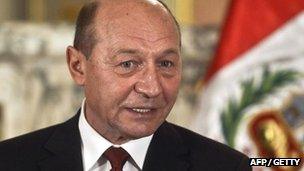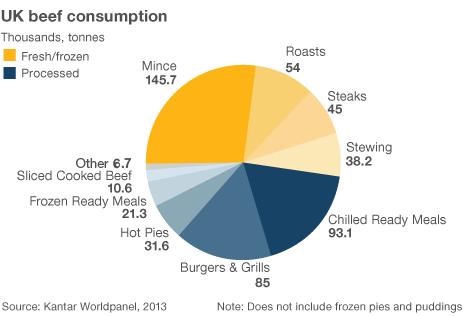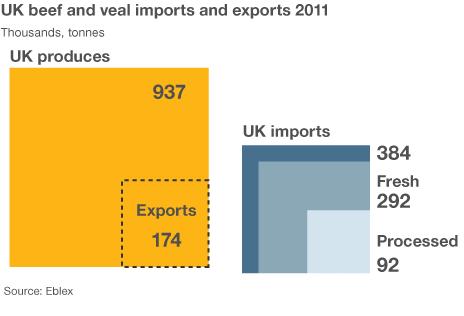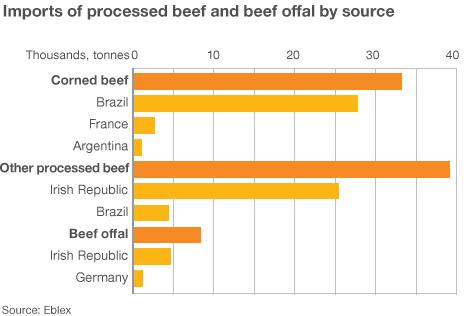Horsemeat scandal: Focus switches to Romania
- Published
Environment Secretary Owen Paterson: "This is an issue, for the moment, of labelling and fraud"
Romanian officials are investigating whether horsemeat found in beef products in Britain and France came from a Romanian abattoir.
They said they would take action if laws had been broken.
Environment Secretary Owen Paterson said a moratorium on EU meat imports, which some people have called for, was not allowed under EU rules.
In France, six supermarket chains have withdrawn ready-meals from food groups Findus and Comigel.
Earlier this week, Findus UK took its frozen beef lasagne, made by Comigel, off the shelves after some were found to have up to 100% horsemeat in them.
Romania's president, Traian Basescu, said if false labelling had been carried out with the intention of making money that would discredit the country for a long time and raise the risk of export restrictions.
Constantin Savu, a representative of Romania's National Food Safety Authority, said more than 25 abattoirs there were authorised not only to butcher horsemeat but also to export it within the EU.
But he added: "We cannot know what happens to it... after it exits the abattoir." He said an investigation was under way to establish what had happened.

Mr Basescu warned Romania would be discredited if claims of false labelling were proven to be true
Speaking about the growing scandal of horsemeat contamination, Mr Paterson said the British government was determined to "get to the bottom of it" and was working closely with other European governments.
But he added: "It looks as if the problem is limited to processed food and it looks as if there has been criminal substitution of beef with horse."
Findus France has said it will take action in the French courts, believing itself to be the victim of fraud.
But the company that supplied the meat, Spanghero, based in southern France, has also said it was the victim of fraud - and intends to sue its Romanian supplier.
In the latest developments:
Six French supermarket chains - Carrefour, Monoprix, Auchan, Casino, Cora and Picard - withdrew ready-meals from Findus and Comigel
Findus UK said the only product on sale in the UK using ingredients from the French supplier had been its beef lasagne product, and all other beef products on sale in the UK had been DNA-tested and cleared
The Food Standards Agency said public institutions, including schools, prisons, hospitals, and the armed forces, should be using reputable suppliers, but if they were not satisfied with their assurances they could require the supplier to conduct tests, and reject or temporarily withhold stock
Health Secretary Jeremy Hunt said he was confident patients eating food in hospitals were not being put at risk, and emphasised that it was fraud issue, rather than a food safety issue
The chairwoman of the Commons food and rural affairs committee, Conservative MP Anne McIntosh, called for a temporary ban on all processed or frozen meat imports from the EU until the source of the contamination was found
Shadow environment secretary Mary Creagh said "a measured, controlled response" which was "proportionate" was needed.
The French minister for consumer affairs, Benoit Hamon, said it appeared financial gain was the motive of the fraud and overall it could have netted the perpetrators £250,000.
Horsemeat in France is not noticeably cheaper than beef, but according to the Green MEP Jose Bove the price of horsemeat has recently fallen dramatically in Romania following a new law there banning horses and carts on the highway.
He said this could have opened tempting possibilities for cheating.

Between fresh and processed, the UK consumes more fresh or frozen beef.

The UK still produces and consumes more of its own beef than it imports

Ireland and Brazil are major suppliers of the UK's imported processed beef
- Published10 February 2013
- Published10 April 2013
- Published9 February 2013
- Published18 January 2013
- Published19 January 2013